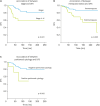Prognostic factors of adult granulosa cell tumors of the ovary: a Turkish retrospective multicenter study
- PMID: 38156722
- PMCID: PMC11107275
- DOI: 10.3802/jgo.2024.35.e39
Prognostic factors of adult granulosa cell tumors of the ovary: a Turkish retrospective multicenter study
Abstract
Objective: To define the clinical, histopathological features and the prognostic factors affecting survival in patients with adult granulosa cell tumors of the ovary (AGCT).
Methods: A 322 patients whose final pathologic outcome was AGCT treated at nine tertiary oncology centers between 1988 and 2021 participated in the study.
Results: The mean age of the patients was 51.3±11.8 years and ranged from 21 to 82 years. According to the International Federation of Gynecology and Obstetrics 2014, 250 (77.6%) patients were stage I, 24 (7.5%) patients were stage II, 20 (6.2%) patients were stage III, and 3 (7.8%) were stage IV. Lymphadenectomy was added to the surgical procedure in 210 (65.2%) patients. Lymph node involvement was noted in seven (3.3%) patients. Peritoneal cytology was positive in 19 (5.9%) patients, and 13 (4%) had metastases in the omentum. Of 285 patients who underwent hysterectomy, 19 (6.7%) had complex hyperplasia with atypia/endometrial intraepithelial neoplasia, and 8 (2.8%) had grade 1 endometrioid endometrial carcinoma. It was found that 93 (28.9%) patients in the study group received adjuvant treatment. Bleomycin, etoposide, cisplatin was the most commonly used chemotherapy protocol. The median follow-up time of the study group was 41 months (range, 1-276 months). It was noted that 34 (10.6%) patients relapsed during this period, and 9 (2.8%) patients died because of the disease. The entire cohort had a 5-year disease-free survival (DFS) of 86% and a 5-year disease-specific survival of 98%. Recurrences were observed only in the pelvis in 13 patients and the extra-abdominal region in 7 patients. The recurrence rate increased 6.168-fold in patients with positive peritoneal cytology (95% confidence interval [CI]=1.914-19.878; p=0.002), 3.755-fold in stage II-IV (95% CI=1.275-11.063; p=0.016), and 2.517-fold in postmenopausal women (95% CI=1.017-6.233; p=0.046) increased.
Conclusion: In this study, lymph node involvement was detected in 3.3% of patients with AGCT. Therefore, it was concluded that lymphadenectomy can be avoided in primary surgical treatment. Positive peritoneal cytology, stage, and menopausal status were independent prognostic predictors of DFS.
Keywords: Disease-Free Survival; Granulosa Cell; Ovarian Carcinoma; Prognostic Factors.
© 2024. Asian Society of Gynecologic Oncology, Korean Society of Gynecologic Oncology, and Japan Society of Gynecologic Oncology.
Conflict of interest statement
No potential conflict of interest relevant to this article was reported.
Figures
References
-
- Schumer ST, Cannistra SA. Granulosa cell tumor of the ovary. J Clin Oncol. 2003;21:1180–1189. - PubMed
-
- Young RH. Sex cord-stromal tumors of the ovary and testis: their similarities and differences with consideration of selected problems. Mod Pathol. 2005;18(Suppl 2):S81–S98. - PubMed
-
- Stenwig JT, Hazekamp JT, Beecham JB. Granulosa cell tumors of the ovary. A clinicopathological study of 118 cases with long-term follow-up. Gynecol Oncol. 1979;7:136–152. - PubMed
-
- Park JY, Jin KL, Kim DY, Kim JH, Kim YM, Kim KR, et al. Surgical staging and adjuvant chemotherapy in the management of patients with adult granulosa cell tumors of the ovary. Gynecol Oncol. 2012;125:80–86. - PubMed


